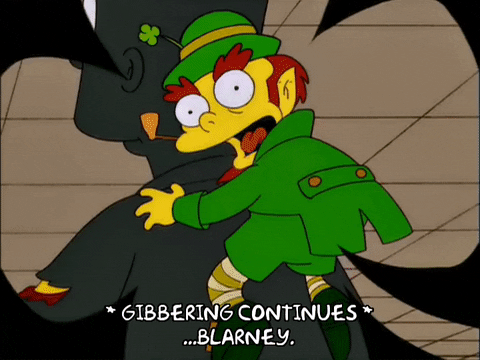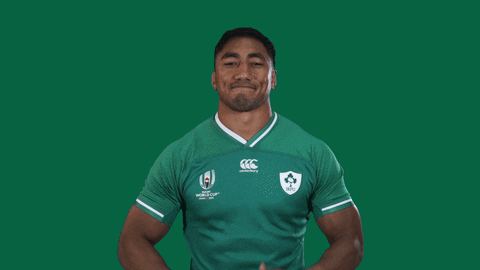- Invitation Status
- Look for groups
- Looking for partners
- Posting Speed
- 1-3 posts per day
- One post per day
- Multiple posts per week
- 1-3 posts per week
- One post per week
- Online Availability
- 8am - 11.30pm GMT
- Writing Levels
- Adept
- Advanced
- Prestige
- Adaptable
- Preferred Character Gender
- Primarily Prefer Female
- Genres
- Fantasy, Modern, Horror, Dystopian, Scifi, Superhuman, Steampunk
St. Patrick's Day: An Authentically Irish Guide
Ah, begorrah and top of the morning' to ya! 'Tis that time of the year again where people celebrate all things Irish... right? Things like fighting leprechauns and lucky clover and speaking Gaelic. Right?

Well, your old pal Absinthe is here to clear up some common misconceptions and share some trivia about my beautiful homeland, Ireland, in the lead up to St. Patrick's Day! Lá Fhéile Pádraig!
The Famous Four-Leafed Clover
...Has almost nothing to do with Ireland or Irish culture. The shamrock, however, is one of our national symbols, and is a motif often associated with St. Patrick! It is said to have been used to help explain the concept of the holy trinity in the Christian faith to the Irish people. It's not uncommon to see Irish folk a bunch of this three leaved plant on St. Patrick's day - as a symbol of Irishness, rather than to bring luck or good fortune.
St Patty vs St Paddy
The correct answer is Paddy! It's a common irritation for many Irish internet dwellers this time of year. While you might think that Pat or Patty is the natural choice when it comes to calling the holiday by its diminutive nickname, in Irish, Patrick is Padraig [pawed-rig], which becomes Paddy. Patty is not a nickname you'll hear often in Ireland; and if it is, it generally refers to a woman.
So, Do You Speak Gaelic?
The Irish language, or Gaeilge, is the national language of Ireland. While it's a mandatory subject at school, most people don't speak it once they leave school... or indeed, outside of that class. There are regions, called Gaeltachta, where Irish is still the primary language... but even there, people will still speak fluent English. You won't need to worry about learning a new language, no matter where you travel if you visit - but it's always appreciated!
As a fun fact, there are several dialects! Connacht, Ulster and Munster Irish are the most prevalent, popping up most prominently in the Irish speaking areas of those regions.
You will hear Irish people talking about Gaelic. That refers to one of our national sport - Gaelic Football! Gaelic - as a language - usually refers to Scots Gaelic, a similar but different language.
We Do Love A Drop of The Good Stuff
Ireland is famous for a certain drink... but we honestly don't get enough credit for our national love of tea. Drinking over two kilos of tea per person per year, Ireland is second only to Turkey in cups of tea drank per capita in the world.
Red Headed Woman
The Irish are famous for our red hair. This is a trope for a reason - we have the highest concentration of redheads per capita in the world, with about 10% of the population having red hair. That compares to about 2% globally. Red hair doesn't make you an automatic hot-head, and it doesn't make you a witch (sadly), but redheads have been noted to require more anesthetic, and have a higher pain threshold than the base population.
Island vs Republic
The island of Ireland, tiny as we may be, is divided into two countries. Northern Ireland, comprising of six counties in - you guessed it - the north of the island. Northern Ireland is part of the UK, and they use the British Pound as currency, and use imperial measurements like miles and feet.
The rest of the island - known as the Republic of Ireland - is an independent state and a member of the European Union. We use the euro as currency, and while older generations would have used the imperial system, we have adopted the metric system as our standard. We have a President as our head of state, and a Prime Minister known as a Taoiseach [Tea - shock].
Northern Ireland and the Republic of Ireland are recognized as separate nations for the most part in sport. An exception to this rule is in rugby, where players from the north and south play on the same team. If you see an Irish rugby match, it's why "Ireland's Call" plays instead of the Republic's national anthem - Amhrán na bhFiann. If you're lucky enough to see a home game, however, you will get both anthems!

and yes I said yes I will Yes
Ireland was the first country to legalize same sex marriage on a national level, by popular vote, back in 2015. It was a momentous occasion... that, thanks to a translation error, also accidentally resulted in temporarily outlawing heterosexual marriage.
Craic is Ninety
Irish slang is in a league of it's own. To give you a quick run down of the essentials:
Craic [crack] - Fun, good times, a state of being in Irish society. If someone refers to you as 'good craic', they like having you around. If someone refers to another as 'minus craic', they're considered uptight and/or a boring person. "What's the craic?" can be translated as 'how's it going?', and doing something 'for the craic', means you're doing it just for kicks.
Class - Great, awesome.
Savage - Another term for great, awesome, or generally amazing.
Yoke - A thing. You know, a whatchamacallit.
Fierce - Very. This usually results in phrases like 'It's fierce mild out today'.
Culchie [Cull-Chi] - Someone from the countryside, or alternatively, someone who isn't from Dublin. May or may not have footed turf, or regularly attended the annual Ploughing Championships.
Eejit - An idiot or a fool, but it's usually used in an affectionate context.
Gobshite - Another term for an idiot, usually used less affectionately.
Yank - Term usually used to refer to an American, from the north or south of the USA.
I will, yeah - I most certainly will not.
Irish folk of Iwaku, did I leave anything out? Or have you got more questions? Planning a trip in the post-pandemic world? How are you celebrating this year?





